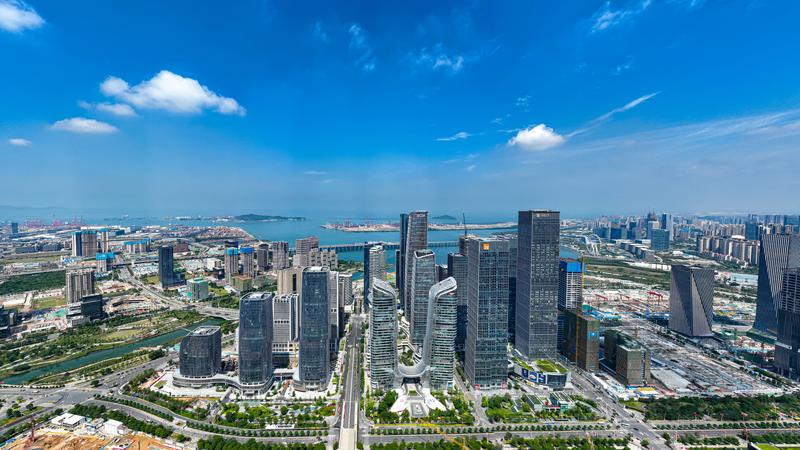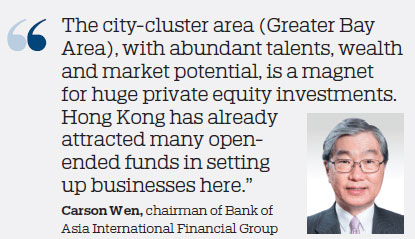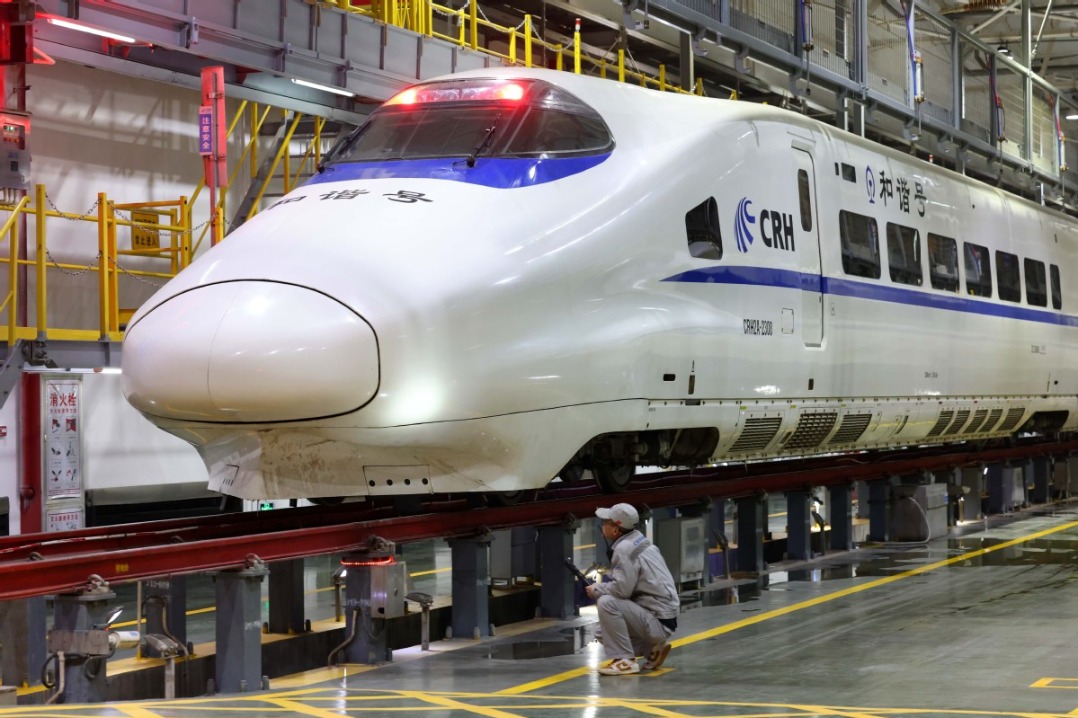Boom seen for private equity businesses


The Hong Kong Special Administrative Region government and Shenzhen's Qianhai Authority jointly promulgated 18 measures recently to provide facilitation and preferential policies for the SAR's private equity industry.
The Qianhai Authority will support Hong Kong's eligible limited partnership funds in setting up qualified investment entities in Qianhai for onshore investment purposes. It will also strengthen the qualified foreign limited partnership pilot program, enhancing the entry threshold and application procedures, expanding the investment scope and reducing the processing time.
Qianhai and Hong Kong will also explore using the cross-border supervisory sandbox mechanism to promote the linked development of private equity markets in Shenzhen and Hong Kong.
"The 18 measures will attract more private equity and venture capital funds to settle in the Greater Bay Area," says Bank of Asia International Financial Group Chairman Carson Wen. "Hong Kong is an active center for the private equity business."
He notes that although the Guangdong-Hong Kong-Macao Greater Bay Area's economic size may be the same as those of other world bay areas (New York, San Francisco and Tokyo), its population is much bigger with more potential for business expansion.
Besides the region's huge population of over 86 million, the 11-city cluster has a comprehensive business value chain for promoting the private equity industry's development.
"The Greater Bay Area, backed by the global financial hub of Hong Kong, the technology innovation center of Shenzhen, the advanced manufacturing facilities of Dongguan, and Foshan's precision engineering, will cement a comprehensive business value chain," says Wen. "This will be the most economically vibrant bay area in the future. But it has to take time to develop its business value chain to the fullest extent."
UBS expects the Greater Bay Area's GDP to exceed $2.6 trillion by 2025, registering a 7.5 percent compound annual growth rate from $1.7 trillion in 2020.
The Switzerland-based investment bank says Guangdong province boasts the highest number of high-tech enterprises in the country, and its research-and-development ratio to GDP is also the highest in the country (3.1 percent in 2020).
"The city-cluster area, with abundant talents, wealth and market potential, is a magnet for huge private equity investments. Hong Kong has already attracted many open-ended funds in setting up businesses here," notes Wen.
The HKSAR has launched various initiatives to strengthen the city as a private equity business center, such as introducing the limited partnership fund regime in August 2020, offering tax concessions for carried interest distributed by eligible private equity funds in Hong Kong in May 2021, and establishing a mechanism in November 2021 to attract foreign funds to redomicile to Hong Kong.
The government's strategy in the private equity business is to bridge capital markets and the real economy, especially for the technology and innovation sector.
Hong Kong is the second-largest private equity hub in Asia after the Chinese mainland, with about 600 private equity firms and over $170 billion in assets under management as of September last year, according to government statistics. The latest incentives have led to the setting up of more than 400 limited partnership funds.
A private equity fund is a general limited partnership formed by private equity firms investing in private companies in multiple sectors, such as technology, fintech, logistics and real estate. These funds may have general investment criteria with an investment time span exceeding 10 years. Private equity fund managers use a wide variety of investment strategies, such as venture capital, growth capital, leveraged buyout or distressed debt.
Promoting the private equity segment also means encouraging family office businesses, as family offices are keen to make alternative investments, such as private equity, to boost their returns. Private equity and family offices constitute two key segments of the wealth management business.
Wen points to the importance of expanding the Cross-boundary Wealth Management Connect to include family offices and security businesses. "This will enable mainland customers to buy more internationalized wealth-management products available in Hong Kong, while mainland financial service providers can also offer diversified wealth-management products to Hong Kong investors."
By expanding the WMC's products range, mainland and Hong Kong banks will refine their wealth management products to meet mainland customers' needs, says Wen.
The HKSAR government will propose legislation this year on a profits tax exemption for eligible family-owned investment holding companies managed by single family offices in Hong Kong. The aim is to attract more ultra-high-net-worth individuals to establish and operate family offices in the city. Family offices are expected to be an emerging investor base for private equity funds along with traditional institutional investors.
According to the Securities and Futures Commission, Hong Kong's private wealth-management industry recorded net fund inflows of HK$638 billion ($81.79 billion) last year. The city had $4.5 trillion in assets under management by late 2020, with 64 percent of the total AUM sourced from non-Hong Kong investors.

- Xinjiang reports highest foreign trade growth in China
- Harbin authorities demand return of pensions paid out to deceased
- Global research project on AI guardrails launched in Beijing
- Partnering with China, embracing opportunities
- China's cyberspace regulators announce measures for protection of minors
- Beijing's 'Rocket Street' promoted at aerospace conference



































